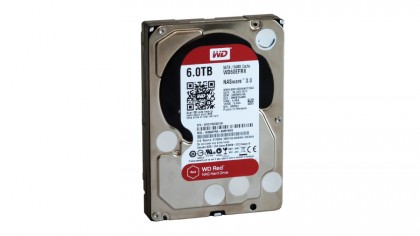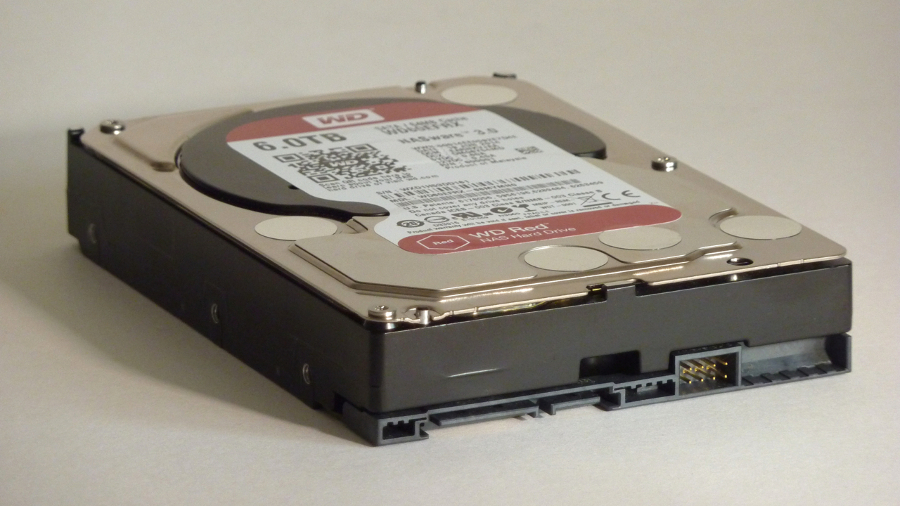TechRadar Verdict
The WD Red 6TB performs excellently, offers a gargantuan amount of storage and is a more affordable proposition than enterprise 6TB hard disks.
Pros
- +
Great performance
- +
Plentiful capacity
- +
Much more affordable than enterprise 6TB disks
Cons
- -
Not the absolute fastest disk performance
- -
Early firmware misconfiguration
Why you can trust TechRadar
The 6TB Western Digital Red is the first 3.5-inch desktop hard disk to offer home users such an enormous storage capacity in a single disk. The alternatives, HGST's Helium He6 and Seagate Enterprise Capacity 6TB, are both intended for the enterprise market, and cost approaching twice as much as the Western Digital Red, which is priced at £210 (around $330, AU$380).
It squeezes 1.2TB of data onto each of its five platters, and like most modern hard disks, has 64MB of cache and a 6Gb/s SATA III connector. When formatted, it provides 5.45 binary TB of data in Windows.
As with other disks in the Red line-up, it has a three-year warranty. It comes with NASWare 3.0, Western Digital's name for the latest version of the firmware it uses with its Red drives. This introduces subtle optimisations to improve performance and reliability when the drives are used constantly in NAS units or RAID arrays that are left running 24 hours a day. A 5TB version is also available, with smaller capacities being upgraded with the newest NASWare 3.0 as well.
Colour coded drives
Western Digital differentiates its hard disk line-up with product names based on colours, with each line intended for different usage scenarios. The priciest Black range are the high-end 7,200 RPM disks, intended for continual use in high-end systems, enterprise environments and workstations.
The Green series reduce heat output and power consumption, at the expense of some performance, which makes them a good choice as a drive for infrequently accessed backups and storage. The Blues are lower-priced units intended for more affordable computers, with a new Purple line recently introduced that is intended for security camera recording systems.
While these names have clearly been dreamt up by a clever marketing department, since really all hard disks are fairly similar, there are a few technical differences.
Hard disks stacked close to each other in a NAS will be subject to more heat and vibration as they chug away than they would in a desktop tower, so the Red series has hardware-based vibration compensation technology to improve long-term reliability when used in arrays of between two and eight drives. This is called StableTrac, described by Western Digital as indicating that the motor shaft is secured at both ends to reduce system-induced vibration and stabilise platters for accurate tracking during read and write operations.
Sign up to the TechRadar Pro newsletter to get all the top news, opinion, features and guidance your business needs to succeed!

Another crucial aspect of hard disk firmware related to NAS use comes in the form of what Western Digital calls time-limited error recovery. If a modern hard disk encounters a bad sector, it attempts to recover it. As it does so, it enters a mode which prevents the host from talking to it for a short period of time.
A software operating system in a desktop PC will carry on as normal once the drive responds again, but a hardware RAID controller will usually drop the entire array if it doesn't hear from a drive after a certain time, causing potential data loss. With the Red series of drives, this time is set to seven seconds, which should mitigate this issue.
Warranty periods vary as well, with the Black series carrying a five-year warranty, in line with the warranties offered by competing enterprise storage brands, while the Green and Blue lines only carry a short two-year warranty.
PR spin
There's more marketing speak with Western Digital using the term 'intellipower' to label how fast most of its consumer drives spin at. The company has never stated exactly what this means, but storage gurus appear to agree that it doesn't mean the speed varies during use.
Instead, it means the actual spin speed of your hard disk is around 5,400 RPM, but it could be slightly lower or faster, depending on the batch it comes from. As they're consumer drives, the Red series are labelled as intellipower.
Western Digital has recently added another line of hard disks, the Red Pro, which are intended for SME and enterprise NAS use. These are marked as 7,200RPM instead of intellipower, and the drives only go from 2TB to 4TB, with a five-year warranty like the Black disks. Western Digital says these drives are optimised for use in larger NAS systems running up to 16 drives.
